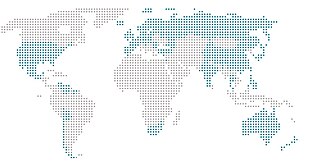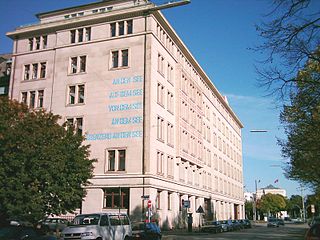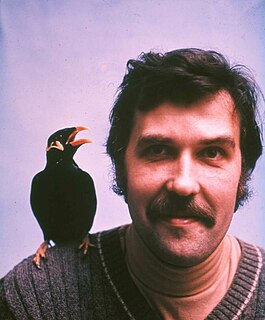
The Leibniz University Hannover, long form in German Gottfried Wilhelm Leibniz Universität Hannover, is a public research university located in Hanover, Germany. Founded on 2 May 1831, it is one of the largest and oldest science and technology universities in Germany. In the 2014/15 school year it enrolled 25,688 students, of which 2,121 were from foreign countries. It has nine faculties which offer 190 full and part degree programs in 38 fields of study. It was named University of Hannover in 1978. In 2006, it was named after Gottfried Wilhelm Leibniz, the 18th century mathematician and philosopher. In 2018, Leibniz University Hannover was adopted as the official English name.

Bert Sakmann is a German cell physiologist. He shared the Nobel Prize in Physiology or Medicine with Erwin Neher in 1991 for their work on "the function of single ion channels in cells," and the invention of the patch clamp. Bert Sakmann was Professor at Heidelberg University and is an Emeritus Scientific Member of the Max Planck Institute for Medical Research in Heidelberg, Germany. Since 2008 he leads an emeritus research group at the Max Planck Institute of Neurobiology.

The Leibniz Association is a union of German non-university research institutes from various disciplines.
The Gottfried Wilhelm Leibniz Prize, in short Leibniz Prize, is awarded by the German Research Foundation to "exceptional scientists and academics for their outstanding achievements in the field of research". Since 1986, up to ten prizes are awarded annually to individuals or research groups working at a research institution in Germany or at a German research institution abroad. It is considered the most important research award in Germany.

The Leibniz Institute of Virology was founded in 1948 by Heinrich Pette, a German neurologist. It began as a research facility to create a polio vaccine. It is now a private foundation and involved with basic research in virology and the immune responses of organisms. The institute is a non-profit public beneficiary organisation and an independent member of the Leibniz Association, located in Hamburg.

The German Academy of Sciences at Berlin, German: Deutsche Akademie der Wissenschaften zu Berlin (DAW), in 1972 renamed the Academy of Sciences of the GDR, was the most eminent research institution of East Germany.

The International Social Survey Programme (ISSP) is a collaboration between different nations conducting surveys covering topics which are useful for social science research. The ISSP researchers develop questions which are meaningful and relevant to all countries which can be expressed in an equal manner in different languages. The results of the surveys provide a cross-national and cross-cultural perspective to individual national studies. By 2021, 58 countries have already taken part in the ISSP.
The Max Planck Institute of Neurobiology is a research institute of the Max Planck Society located in Martinsried, a suburb of Munich in Germany. Research centers on the basic mechanisms and functions of the developing and adult nervous system. Main focus areas include the mechanisms of information processing and storage. It is one of 80 institutes in the Max Planck Society.

The Max Planck Institute for Psycholinguistics is a research institute situated on the campus of Radboud University Nijmegen located in Nijmegen, Gelderland, the Netherlands. The institute was founded in 1980 by Pim Levelt, and is particular for being entirely dedicated to psycholinguistics, and is also one of the few institutes of the Max Planck Society to be located outside Germany. The Nijmegen-based institute currently occupies 5th position in the Ranking Web of World Research Centers among all Max Planck institutes. It currently employs about 235 people.

The German Institute for Global and Area Studies (GIGA) is a German research institute. It analyses political, economic and social developments in Africa, Asia, Latin America and the Middle East, and combines this analysis with comparative research on international relations, development and globalisation, violence and security, and political systems. The GIGA advises the Federal Foreign Office and other branches of the federal government. Since 2009, it has had an office in Berlin.

The Leibniz Institute DSMZ - German Collection of Microorganisms and Cell Cultures GmbH, located in Braunschweig, is a research infrastructure in the Leibniz Association. Also the DSMZ is the world's most diverse collection of bioresources. These include microorganisms as well as more than 840 human and animal cell cultures, over 1. 500 plant viruses, over 940 bacteriophages, and 250 plasmids. Since 2010, the scientific director of the Leibniz Institute DSMZ has been Jörg Overmann, a microbiologist with a PhD. He holds a professorship in microbiology at the Technical University of Braunschweig. Since August 2018, he has led the institute in a dual leadership with Bettina Fischer as administrative director.

The National Library of Economics is the world's largest research infrastructure for economic literature, online as well as offline. The ZBW is a member of the Leibniz Association and has been a foundation under public law since 2007. Several times the ZBW received the international LIBER Award for its innovative work in librarianship. The ZBW allows for access of millions of documents and research on economics, partnering with over 40 research institutions to create a connective Open Access portal and social web of research. Through its EconStor and EconBiz, researchers and students have accessed millions of datasets and thousands of articles. The ZBW also edits two journals: Wirtschaftsdienst and Intereconomics.

Otto Detlev Creutzfeldt was a German physiologist and neurologist. He was the son of Hans Gerhard Creutzfeldt and the younger brother of Werner Creutzfeldt, a professor of internal medicine.

The Leibniz Institute for Solar Physics, formerly known as Kiepenheuer Institute for Solar Physics (KIS) is a research institute located in Freiburg, Germany. As a member of the Leibniz Association, the institute conducts basic research in astronomy and astrophysics with a particular focus on solar physics. The institute's structure and operation is based on three strategic pillars: 1) fundamental research, 2) operation of the German solar telescope infrastructure on Tenerife, and 3) applied research in data science and operation of the Science Data Center. Institute's Professors appointed and habilitated at the University of Freiburg offer lectures at various university degree levels and train young scientists.
The Leibniz-Zentrum für Marine Tropenforschung (ZMT) in Bremen, Germany is the only scientific institute in Germany that exclusively investigates tropical and subtropical coastal ecosystems and their significance for nature and humans in an interdisciplinary approach. The mission of ZMT is to provide a scientific basis for the protection and sustainable use of tropical coastal ecosystems by conducting research, capacity development and consulting activities in close cooperation with national and international partners in the tropics. Since its launch in 1991, ZMT has also developed a huge network of research and political partners within the tropics and worldwide, including more than 800 alumni. The institute offers a broad range of research infrastructure, including its own scientific diving centre and laboratories such as the Marine Experimental Ecology Facility (MAREE). ZMT also hosts the Future Earth Coasts (FEC) office, a global network of experts investigating the drivers of global change in coastal zones.
Magdalena Götz is a German neuroscientist. She is noted for her study of glial cells and holds a chair at Ludwig Maximilian University of Munich's Department of Physiology. She is involved in the field of adult neurogenesis. Götz discovered that glial cells are neural stem cells in the developing mammalian brain. Current investigations study the mechanisms involved in determining how adult neural stem cells are specified. Götz current work focuses on refining ways to reprogram glial cells into neurons in organisms with traumatic brain injury. The German Stem Cell Network published an interview with Dr. Götz in 2015 explaining her research field.

Henning Scheich is a German brain researcher and psychiatrist. He was director of the Leibniz Institute for Neurobiology until 2010 and head of the institute department until 2013. Since 2014 he serves as the chairman of an emeritus group at the institute. He has made substantial contributions to the field of brain research, in particular on the mechanisms of perception, behaviour and their adaptability. Within the framework of the Gottfried Wilhelm Leibniz Science Association he has exerted a lasting influence on the German community of researchers.
Frank Bradke is a German neurobiologist who works on the physiological regeneration of nerve cells in the central nervous system. In 2016, he was awarded the Gottfried Wilhelm Leibniz Prize for his "pioneering research in the field of regenerative neurobiology." He is currently a Group Leader at the German Center for Neurodegenerative Diseases. He is a member of the Editorial Board for Current Biology.












